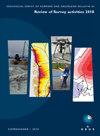A new Middle Pleistocene interglacial occurrence from Ejby, Sjælland, Denmark
IF 1.3
4区 地球科学
Q1 GEOLOGY
引用次数: 0
Abstract
Despite more than a century of investigations, parts of the Quaternary stratigraphy of Denmark with their fragmented record of deposits remain ambiguous. Here we describe a newly found interglacial clay deposit from Ejby on Sjælland, Denmark, from a borehole at 55.695°N, 11.839°E (terrain elevation 5.7 m above sea level). We place the new occurrence on record and provide details of the macrofossil analysis of the sample. The clay contains remains of the present-day temperate bivalve Corbicula fluminalis and the caddis fly Hydropsyche contubernalis – both inhabiting rivers. The presence of C. fluminalis indicates that the deposit most probably is of Middle Pleistocene age, older than the last interglacial, the Eemian.丹麦Sjælland Ejby中更新世间冰期新事件
尽管进行了一个多世纪的调查,但丹麦第四纪地层的部分内容及其零散的矿床记录仍然模糊不清。在这里,我们描述了一个来自丹麦Sjælland的Ejby的新发现的间冰期粘土矿床,该矿床位于55.695°N,11.839°E(海拔5.7米)的钻孔中。我们将新的事件记录在案,并提供样本的宏观化石分析细节。粘土中包含了现今温带双壳类的河蚌(Corbicula fluminalis)和球童蝇(Hydrophys contubernalis)的遗骸,它们都栖息在河流中。C。fluminalis表明矿床最有可能是中更新世,比上一次间冰期Eemian更古老。
本文章由计算机程序翻译,如有差异,请以英文原文为准。
求助全文
约1分钟内获得全文
求助全文

 求助内容:
求助内容: 应助结果提醒方式:
应助结果提醒方式:


